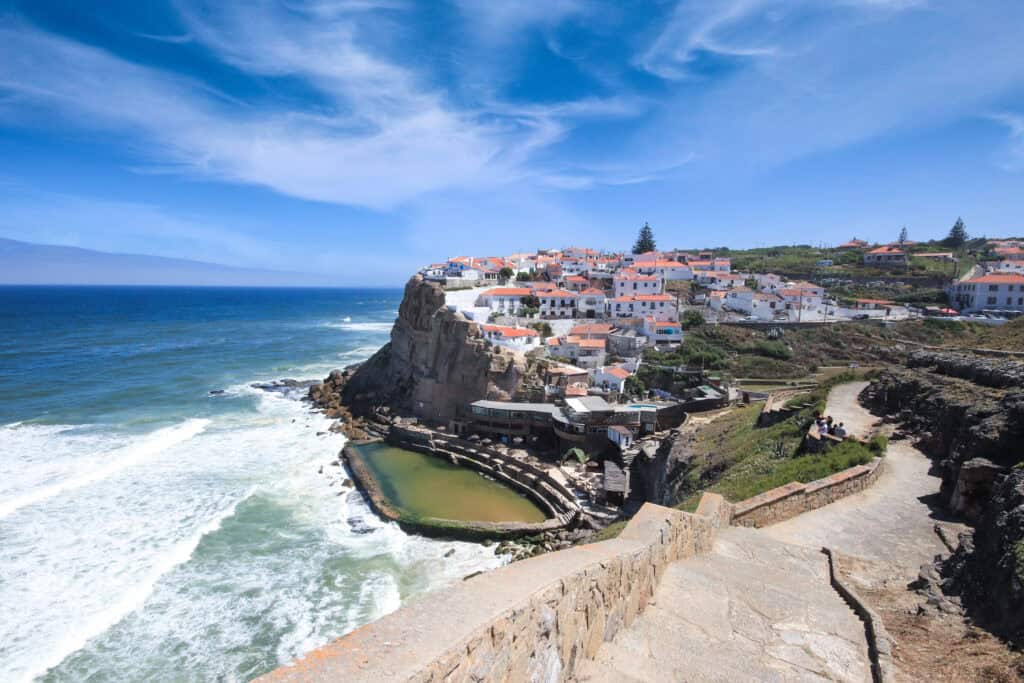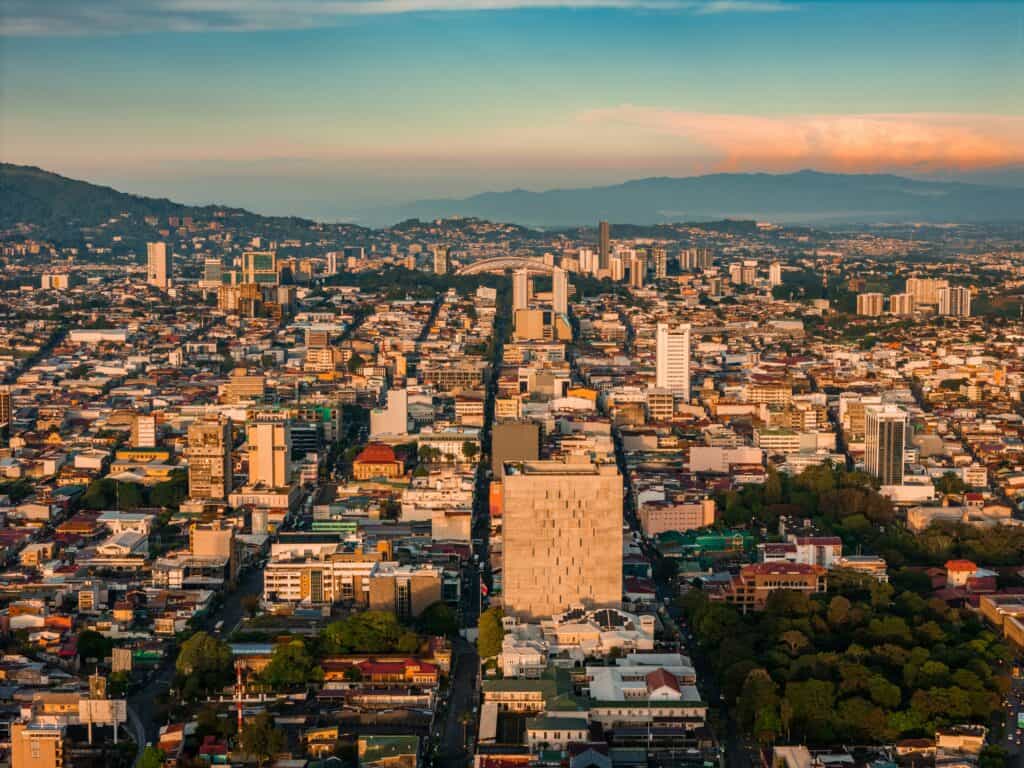Top 5 Digital Nomad Visas in 2025 for US Expats
August 12, 2025 | Blog, Digital Nomad | 7 minute read
Expat Tax Blog. Tax Tips for US Americans abroad.
Updated August 12, 2025
 All blogs are verified by Enrolled Agents and CPAs
All blogs are verified by Enrolled Agents and CPAs
Updated August 12, 2025

Over the past few years, the way Americans live and work abroad has changed dramatically. What began as a temporary shift during the pandemic has evolved into a lasting lifestyle for many digital nomads and remote workers. With more employers embracing location-independent roles and more countries offering digital nomad visas, it’s now easier than ever for American citizens to live and work overseas legally.
In this article, we share our top 5 picks for the best digital nomad visas in 2025, including requirements, income thresholds, and key benefits.
What Is a Digital Nomad Visa?
A digital nomad visa lets remote workers legally live in a country while working for a foreign employer. These visas typically last up to 12 months, and many offer benefits like tax breaks or extensions. Unlike tourist visas, they allow longer stays and legal remote work, as long as you can prove you have sufficient income to support yourself.
Portugal’s Digital Nomad Visa

Introduced in October 2022, Portugal’s D8 Digital Nomad Visa is a residency option designed for remote workers and freelancers earning income from abroad. With its mild climate, coastal cities, rich culture, and relatively low cost of living compared to other Western European countries, Portugal has quickly become a favorite among US expats and digital nomads.
Eligibility & Requirements:
- Who can apply: Non‑EU/EEA/Swiss citizens
- Income requirement: Approx. €3,280/month ($3,480 US)
- Visa duration: 4‑month visa, 2‑year residence permit, renewable up to 5 years
- Visa type: D8 Digital Nomad
- Fees: $75 for the visa + $90 for the residence permit
- Dependents: Can be included on the visa
- Application method: You can apply through a Portuguese consulate
Why it stands out:
Portugal offers remote workers a high quality of life, access to public healthcare, and the freedom to travel throughout the broader Schengen Area with a clear path to permanent residency and citizenship after five years. It’s regularly ranked among the best places for digital nomads thanks to its sunny climate, vibrant coworking scene, and thriving expat community.
Estonia’s Digital Nomad Visa

Introduced in 2020, Estonia became the first country in the world to officially launch a Digital Nomad Visa, allowing remote workers and freelancers to live in Estonia while working for foreign employers. Known for its advanced digital infrastructure and pioneering e‑Residency program, Estonia is a top pick for tech-savvy nomads.
Eligibility & Requirements:
- Who can apply: All nationalities
- Income requirement: Approx. €42,700/year ($46,000 US)
- Visa duration: valid for 1 year, renewable for up to 2 years
- Visa type: long-stay visa (D-Visa)
- Fees: $105
- Dependents: Must apply separately
- Application method: You can apply through a local Estonian consulate
Why it stands out:
Estonia blends modern tech infrastructure with EU Schengen access, offering digital nomads an efficient, innovation-driven environment. The visa also allows you to apply for the country’s pioneering e‑Residency program, a government-issued digital ID that allows non-residents to start and manage an online EU-based business.
Panama’s Digital Nomad Visa

Introduced in May 2021, Panama’s Short Stay Visa for Remote Workers was created to attract digital nomads and remote professionals seeking a tropical, business-friendly base. Known for its warm climate, modern infrastructure, and use of the US dollar, Panama stands out as one of the most developed countries in Central America. It offers both comfort and convenience to remote professionals.
Eligibility & Requirements:
- Who can apply: Non‑Panamanian citizens working remotely for foreign companies
- Income requirement: At least $36,000/year in foreign income
- Visa type: Short-stay remote work visa
- Visa duration: 9 months, extendable once for another 9 months
- Fees: $300
- Dependents: Not specifically included; must apply separately
- Application method: Through a local Panamanian embassy/consulate or via an immigration lawyer in Panama
- Tax incentive: Panama offers no local income tax on foreign earned income
Why it stands out:
Panama offers no local income tax on foreign earned income and operates on the US dollar, making it especially appealing for American digital nomads. Its well-developed infrastructure and strong connectivity make it a practical choice for remote work.
Thailand’s Digital Nomad Visa

Thailand has long been a favorite among digital nomads, with hotspots like Chiang Mai and Bangkok offering an ideal mix of affordability, culture, and lifestyle. The introduction of Thailand’s digital nomad visa, the Destination Thailand Visa (DTV), in 2024 finally aligns immigration policy with this reality. It offers remote workers a legal, stable way to stay in the country long-term without the need for constant tourist visa extensions.
Eligibility & Requirements:
- Who can apply: Non-Thai nationals, age 20 or older
- Income requirement: At least 500,000 THB ($14,400 USD) in savings or consistent foreign income
- Visa duration: Valid for up to 5 years, with renewable 180-day stays
- Visa type: Destination Thailand Visa (DTV)
- Fees: 10,000 THB ($275 USD) for the initial application
- Dependents: Spouses and children can apply separately under similar criteria
- Application method: Can apply online or through a Thai consulate
Why it stands out:
Known for its world-class food, wellness retreats, and thriving coworking culture, it offers an ideal work-life balance. With no Thai taxes on foreign income if not remitted in the same tax year, and a relatively low financial threshold, Thailand remains one of the most attractive destinations for American expats in 2025.
Costa Rica’s Digital Nomad Visa

Introduced in 2022, Costa Rica’s Digital Nomad Visa is one of the most accessible options for remote workers seeking both adventure and stability. Known for its biodiversity, stable democracy, and laid-back “pura vida” lifestyle, Costa Rica attracts expats with its friendly culture, warm climate, and affordable healthcare.
Eligibility & Requirements:
- Who can apply: Non‑Costa Rican nationals
- Income requirement: $3,000/month (individual) or $4,000/month (with dependents)
- Visa duration: 1 year, renewable for another year
- Visa type: Digital nomad visa
- Fees: $190–$200
- Dependents: Can be included
- Application method: Online or through a Costa Rican embassy
- Tax incentives: Foreign income is tax-exempt under the digital nomad visa (Law 10008)
Why it stands out:
Costa Rica combines stunning natural beauty with access to public healthcare and Blue Zone living areas known for health and longevity. With a family-friendly visa option, and tax incentives, it’s a top choice for American digital nomads seeking balance and well-being.
At a Glance: Visa Comparison
| Destination | Visa Duration | Income Requirement | Key Benefits |
|---|---|---|---|
| Portugal | Up to 5 years (renewable) | $3,480/month | Schengen access, high quality of life, path to citizenship |
| Estonia | 1 year, renewable up to 2 | $46,000/year | Schengen Area access, tech-forward environment, and access to the e‑Residency program |
| Panama | 9–18 months | $36,000/year | No local tax on foreign income, US dollar economy |
| Thailand | 5 years (180-day stays) | 500,000 THB (~$14,400 USD) in savings/income | No Thai tax on foreign income (if not remitted), wellness hubs |
| Costa Rica | 1–2 years | $3,000/month ($4,000 with dependents) | Public healthcare, family-friendly, tax exemption under Law 10008, and home to one of the world’s Blue Zones |
Digital Nomad Taxes for US Expats
Even while living abroad, American digital nomads are still responsible for filing a US tax return. Citizens and Green Card holders are taxed on their worldwide income due to America’s citizenship-based taxation system. This means you must report your worldwide income to the IRS regardless of where you live or work.
Fortunately, most US expats can significantly reduce or even eliminate their US tax bill thanks to IRS provisions designed to help Americans avoid double taxation abroad.
To avoid double taxation, you may qualify for:
- Foreign Earned Income Exclusion (FEIE): Exclude up to $130,000 in 2025 of foreign earned income if you meet the physical presence or bona fide residence test.
- Foreign Tax Credit (FTC): Claim a dollar-for-dollar credit for income taxes paid to a foreign government.
In addition to filing a US tax return, US expats must meet several reporting requirements, especially if they hold foreign assets or bank accounts.
- FATCA (Form 8938): Required for reporting foreign financial assets if they exceed IRS thresholds.
- FBAR (FinCEN 114): This must be filed if your combined foreign accounts exceed $10,000 at any point in the year.
Digital nomads should plan ahead to stay compliant, not just with US tax rules, but also local tax laws in their host country.
Self-Employment Tax for Digital Nomads
The majority of digital nomads are self-employed, whether freelancing, consulting, or running their own business. If that’s you, you’re still responsible for US self-employment tax. This 15.3% tax covers Social Security and Medicare and applies to your net earnings, no matter where in the world you live.
Even if you qualify for the Foreign Earned Income Exclusion (FEIE) or Foreign Tax Credit (FTC) to reduce your income tax, self-employment tax still applies. It’s a common oversight among first-time expats, so be sure to factor it into your financial planning.
Reusable Callout-Box
*For design changes please notify Dev Team.
*For bullet points use: •
Need to know how US taxes work for digital nomads?
Check out our complete guide to digital nomad taxes. It covers everything from key tax benefits to reporting rules, all tailored for Americans working remotely abroad.
Final Thoughts
Whether you’re chasing waves in Costa Rica, co-working in Bangkok, or settling into life in Lisbon, 2025 is shaping up to be a great year for American digital nomads. From Lisbon to Tallinn to Chiang Mai, some of the best places for digital nomads now offer clear, accessible visa pathways, making living and working abroad easier than ever. Just be sure to stay informed, meet the requirements, and stay tax compliant along the way.
Need Help Staying Tax Compliant as an American digital nomad?
MyExpatTaxes simplifies US tax filing for digital nomads, helping you stay compliant with reporting requirements and ensuring you get the tax benefits and credits you’re entitled to. Our easy-to-use software is built specifically for expats, and if you need extra guidance, our expert tax professionals are here to help. Wherever you are in the world, we make staying on top of your taxes stress-free, so you can move on to your next adventure with peace of mind.
Digital Nomad Visas FAQ
What are the best places for digital nomads in 2025?
Some of the best places for digital nomads in 2025 include Lisbon (Portugal), Tallinn (Estonia), Panama City (Panama), Chiang Mai (Thailand), and Tamarindo (Costa Rica). These destinations offer a balance of reliable internet, coworking spaces, affordable living, vibrant communities, and accessible digital nomad visas.
Which digital nomad visa is easiest for US citizens to get?
Costa Rica’s Digital Nomad Visa and Portugal’s D8 Visa are among the most accessible for US citizens, with relatively low income requirements and straightforward application processes.
Do American digital nomads still have to pay US taxes?
Yes. The US taxes citizens on worldwide income, even if they live abroad. However, you may qualify for benefits like the Foreign Earned Income Exclusion (FEIE) or the Foreign Tax Credit (FTC) to reduce or eliminate your US tax bill.
Can I bring my family with me on a digital nomad visa?
Many countries allow dependents to join under the same visa or a related family visa. For example, Portugal and Costa Rica allow dependents on the same application, while Estonia and Thailand require separate applications but have family-friendly provisions.
How long can I stay in a country with a digital nomad visa?
Visa durations vary. Thailand offers up to 5 years (in renewable 180-day increments), Portugal up to 5 years, Estonia up to 2 years, Costa Rica up to 2 years, and Panama up to 18 months.
Do I have to pay taxes in my host country as a digital nomad?
It depends on the country. Many digital nomad visas, like those in Panama, Thailand, and Costa Rica, offer tax exemptions on foreign-earned income. However, rules vary, and you may still be liable for local taxes if you meet your host country’s residency threshold—usually 180 days or more in a calendar year.
Do I need health insurance to apply for a digital nomad visa?
Yes, most countries require proof of private health insurance that covers your entire stay, including both routine and emergency medical care. However, some destinations—such as Portugal and Costa Rica—also grant access to their public healthcare systems once you become a legal resident, though you may still need to show private coverage at the time of application.

Written by Nathalie Goldstein, EA
Nathalie Goldstein, EA is a leading expert on US taxes for Americans living abroad and CEO and Co-Founder of MyExpatTaxes. She contributes to Forbes and has been featured in Forbes, CNBC and Yahoo Finance discussing US expat tax.
August 12, 2025 | Blog, Digital Nomad | 7 minute read



